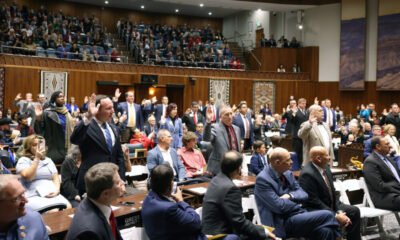budget
Missouri’s Hawley Champions Radiation Exposure Fund in Landmark U.S. Senate Mega-Bill

WASHINGTON — U.S. Senator Josh Hawley of Missouri has lauded the inclusion of radiation exposure compensation funds in the Senate’s version of a significant budget reconciliation bill. This legislation aims to extend and broaden tax cuts while also making cuts to social safety net programs.
On Friday, Hawley emphasized that the revived and expanded fund would benefit Americans in several states, including Arizona, Colorado, and Kentucky, calling it a “tremendous day” for Missouri residents and nuclear radiation survivors nationwide. “This is a chance, finally, to make it right,” he stated during a press call.
The senator pointed to federal negligence in nuclear testing and disposal programs as a key reason for the need for this compensation. “Citizens have been unknowingly exposed to nuclear radiation over the years,” he noted.
The bipartisan legislation was incorporated by the Republican-led Senate Judiciary Committee, of which Hawley is a member. This complex budget reconciliation process, involving ten Senate committees, requires only a simple majority to pass.
If the Senate approves this version, the House will need to reconcile its own, which currently does not include a reauthorization of the radiation exposure fund.
Background on the Radiation Exposure Compensation Fund
Established in 1990, the Radiation Exposure Compensation Fund (RECA) provides one-time payments to individuals who contracted specific illnesses due to involvement with U.S. nuclear tests or who lived downwind from test sites in states including Arizona and Utah. Additionally, workers in the uranium industry across 11 states who developed qualifying diseases may also receive compensation.
The U.S. conducted over 1,000 atomic tests from 1945 to 1992, beginning with the Trinity Test in New Mexico. The fund has historically been administered by the Department of Justice, which had approved $2.3 billion in benefits by June 2022.
While the Senate passed a similar bipartisan bill in March 2024, it failed to make it through the House. The current proposal aims to expand compensation to communities impacted by radioactive waste in several states, increasing one-time payments to affected individuals or their families up to $100,000.
Missouri advocate Dawn Chapman, co-founder of Just Moms STL, highlighted the devastating health effects faced by families in the St. Louis area. “The bipartisan RECA family represents diverse backgrounds and communities,” she said. “We hope this is one part of the bill that everyone will support.”
Current Legislative Climate
Republicans are working diligently to limit expenditures as they pursue President Donald Trump’s tax cut promises, which are estimated to cost around $3.9 trillion. To fund these tax cuts, proposed cuts to social safety net programs include $902 billion in Medicaid reductions and significant cuts to the Supplemental Nutrition Assistance Program (SNAP), amounting to a $285.7 billion drop in federal spending.
A recent Congressional Budget Office (CBO) analysis warned that the overall bill could add $2.4 trillion to the national deficit over the next decade. Hawley, affirming his opposition to Medicaid cuts, cited the importance of maintaining benefits, particularly for rural hospitals in Missouri, half of which could be affected.
He is also advocating to increase the child tax credit to $5,000, up from a temporary $2,500 proposed in the House version. However, he refrained from directly commenting on whether this remained a priority amid ongoing negotiations.

















